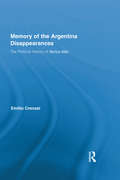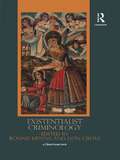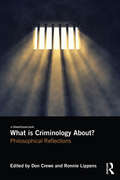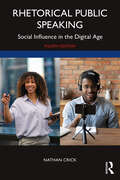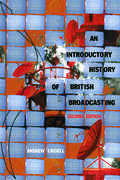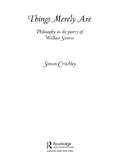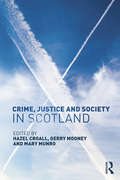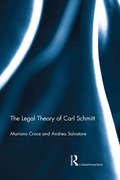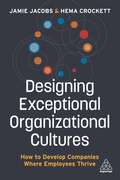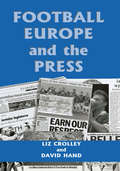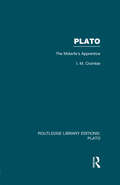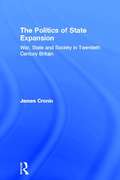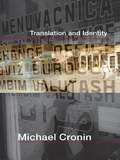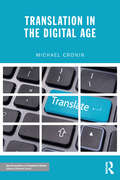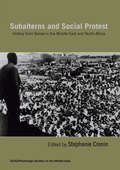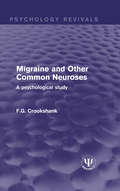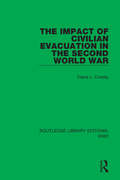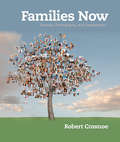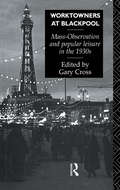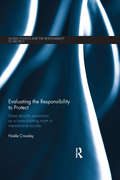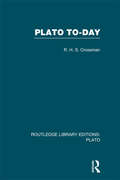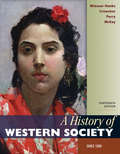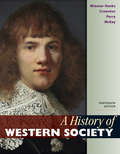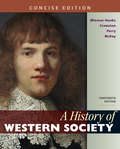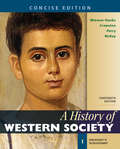Special Collections
Benetech’s Global Certified Accessible Titles
Description: Benetech’s GCA program is the first independent third-party EPUB certification to verify ebook accessibility. By creating content that is born accessible, publishers can meet the needs of all readers. Learn more: https://bornaccessible.benetech.org/
- Table View
- List View
The Memory of the Argentina Disappearances
by Emilio CrenzelMemory of the Argentina Disappearances examines the history of the production, public circulation, and the interpretations and reinterpretations of the Nunca Más report issued by Argentina’s National Commission on the Disappearance of Persons (CONADEP). It was established in 1983 by constitutional president Raúl Alfonsín to investigate the fate of thousands of people who had been disappeared by the state during the seventies. Upon publication in 1984, Nunca Más became a bestseller, was translated into several languages and won greater public importance when the military juntas were brought to trial and the court accepted the report as key evidence. The report’s importance was further enhanced with the adoption of CONADEP and Nunca Más as models for truth commissions established in Latin America, and when it was postulated as a means for conveying an awareness of this past to Argentina’s younger generations. This book contributes to understanding the political processes that led to Nunca Más becoming the way in which Argentines remembered the disappearances and the country’s political violence, and how its meaning is modified by new interpretations. Given the canonical nature of Nunca Más, the book sheds light on the most substantial changes and the continuities in Argentina’s social memory of its recent past.
Existentialist Criminology
by Ronnie Lippens and Don CreweExistentialist Criminology captures an emerging interest in the value of existentialist thought and concepts for criminological work on crime, deviance, crime control, and criminal justice. This emerging interest chimes with recent social and cultural developments - as well as shifts in their theoretical consideration - that are oriented around contingency and unpredictability. But whilst these conditions have largely been described and analysed through the lens of complexity theory, post-structuralist theory and postmodernism, there exploration by critical criminologists in existentialist terms offers a richer and more productive approach to the social and cultural dimensions of crime, deviance, crime control and, more broadly, of regulation and governance. Covering a range of topics that lend themselves quite naturally to existentialist analysis - crime and deviance as becoming and will, the existential openness of symbolic exchange, the internal conversations that take place within criminal justice practices, and the contingent and finite character of resistance - the contributions to this volume set out to explore a largely untapped reservoir of critical potential.
What is Criminology About?
by Ronnie Lippens and Don CreweSince its inception, criminology has had trouble answering the question of what it is about. But although many consider the answer to this question to be self-evident, this book pursues the provocative possibility that criminology does not know what the object of its study is; it merely knows what it is called. Aiming to foster dissent among those who claim to know what criminology is about – and those who don’t – writers from different schools of thought come together in this collection to answer the question "what is criminology about?" Building on a resurgence of interest in the nature of the object of criminology, their responses aim to deepen, and to expand, the current debate. This book will, then, be of considerable interest to contemporary proponents and students of criminology and law.
Rhetorical Public Speaking
by Nathan CrickThis textbook offers an innovative approach to public speaking by employing the rhetorical canon as a means of constructing artful speech in a multi-mediated environment. By stressing how contemporary public speaking continues the classical art of persuasion, this book provides a foundation to guide students in constructing and delivering messages that address matters of concern and interest to their audience. This edition features contemporary as well as historical examples to highlight key concepts and show how rhetoric works in practice. It not only emphasizes the traditional skills of face-to-face oratory, but it also includes a chapter solely dedicated to highlighting the techniques and tactics of digital social influencing that adapts public speaking to online platforms. Each chapter includes speech excerpts, summaries, and exercises for review and retention. This textbook for courses in public speaking and rhetoric will particularly appeal to instructors wishing to foreground speaking as engaged citizens on public and political issues. Online resources include an instructor’s manual with discussion and test questions, video links, and sample materials.
An Introductory History of British Broadcasting
by Andrew CrisellAn Introductory History of British Broadcasting is a concise and accessible history of British radio and television. It begins with the birth of radio at the beginning of the twentieth century and discusses key moments in media history, from the first wireless broadcast in 1920 through to recent developments in digital broadcasting and the internet.Distinguishing broadcasting from other kinds of mass media, and evaluating the way in which audiences have experienced the medium, Andrew Crisell considers the nature and evolution of broadcasting, the growth of broadcasting institutions and the relation of broadcasting to a wider political and social context. This fully updated and expanded second edition includes:*the latest developments in digital broadcasting and the internet*broadcasting in a multimedia era and its prospects for the future*the concept of public service broadcasting and its changing role in an era of interactivity, multiple channels and pay per view*an evaluation of recent political pressures on the BBC and ITV duopoly*a timeline of key broadcasting events and annotated advice on further reading.
Things Merely Are
by Simon CritchleyThis book is an invitation to read poetry. Simon Critchley argues that poetry enlarges life with a range of observation, power of expression and attention to language that eclipses any other medium. In a rich engagement with the poetry of Wallace Stevens, Critchley reveals that poetry also contains deep and important philosophical insight. Above all, he agues for a 'poetic epistemology' that enables us to think afresh the philosophical problem of the relation between mind and world, and ultimately to cast the problem away.Drawing astutely on Kant, the German and English Romantics and Heidegger, Critchley argues that through its descriptions of particular things and their stubborn plainness - whether water, guitars, trees, or cats - poetry evokes the 'mereness' of things. It is this experience, he shows, that provokes the mood of calm and releases the imaginative insight we need to press back against the pressure of reality. Critchley also argues that this calm defines the cinematic eye of Terrence Malick, whose work is discussed at the end of the book.
Crime, Justice and Society in Scotland
by Hazel Croall and Gerry Mooney and Mary MunroCrime, Justice and Society in Scotland is an edited collection of chapters from leading experts that builds and expands upon the success of the 2010 publication Criminal Justice in Scotland to offer a comprehensive and critical overview of Scottish criminal justice and its relation to wider social inequalities and social justice. This new volume considers criminal justice in the context of the Scottish politics and the recent referendum on independence and it includes a discussion of the complex relationships between criminal justice and devolution, nationalism and nation building. There are new chapters on research and policy, sectarianism, gangs, victims and justice, organised crime and crimes of the powerful in Scotland, as well as chapters reflecting on the use of electronic monitoring, desistance and practice, and major changes in the structure of Scottish policing. Comprehensive and topical, this book is essential reading for academics and students in the fields of criminal justice, criminology, law, social science and social policy. It will also be of interest to practitioners, researchers, policymakers, civil servants and politicians.
The Legal Theory of Carl Schmitt
by Mariano Croce and Andrea SalvatoreThe Legal Theory of Carl Schmitt provides a detailed analysis of Schmitt’s institutional theory of law, mainly developed in the books published between the end of the 1920s and the beginning of the 1930s. By reading Schmitt’s overall work through the lens of his institutional turn, the authors offer a strikingly different interpretation of Schmitt’s theory of politics, law and the relation between these two domains. The book argues that Schmitt’s adhesion to legal institutionalism was a key theoretical achievement, based on serious reconsideration of the main flaws of his own decisionist paradigm, in the light of the French and Italian institutional theories of law. In so doing, the authors elucidate how Schmitt was able to unravel many of the impasses that affected his previous conceptual framework. The authors also make comparisons between Schmitt and other leading legal theorists (H. Kelsen, M. Hauriou, S. Romano and C. Mortati) and explain why the current legal debate should take into serious account his legacy.
Designing Exceptional Organizational Cultures
by Jamie Jacobs and Hema CrockettDesigning Exceptional Organizational Cultures is a practical guide for HR and OD professionals which explains how to proactively design, build and foster a culture that creates employee and business success. For a company to outperform the competition and achieve sustainable business growth, it needs a high performing, engaged and committed workforce with the skills the business needs both now and in the future. Attracting, motivating and retaining top talent can't be done simply by attaching individual benefits to specific job roles. To be effective, companies need to build an exceptional company culture where people want to work and that allows them to develop and perform to their full potential. Designing Exceptional Organizational Cultures provides guidance on all elements of building a top performing culture including how to identify and define core company values and embed them throughout policies, processes and behaviours as well as how to create an organizational structure that leverages employees' strengths for optimum performance. It also covers how to assess what roles the business needs, how to recruit for future success and make the most of non-traditional hires as well as covering employee engagement, motivation, reward, diversity and Learning and Development (L&D). With practical examples, tips and advice throughout , this is crucial reading for anyone needing to build a culture that attracts the very best talent and achieve sustainable business growth.
Football, Europe and the Press
by Liz Crolley and David HandThis book examines the construction of national, regional, and group identities in the football journalism of five European countries: England, France, Germany, Italy and Spain. Notions of the respective national stereotypes are explored in each of the countries studied.
Plato
by I M CrombieIn Plato’s Theaetetus, Socrates is portrayed as a midwife to the intellect, a metaphor for his task as a dialectician as he seeks to help give birth to wisdom. Thus it is that the author refers to Plato as the midwife’s apprentice. This volume represents an attempt to provide a more manageable account of the author’s two volume magnum opus, An Examination of Plato’s Doctrines. An accessible and lucid introduction to Plato’s ideas is provided which nonetheless challenges traditional interpretations. In particular the author is concerned to offer an interpretation of the significance of what Plato said. The chapters are arranged by topic, for ease of comprehension.
The Politics of State Expansion
by James CroninThe expansion of the British state was neither automatic nor accidental. Rather, it was the outcome of recurring battles over the proper boundaries of the state and its role in economy and society. The Politics of State Expansion focuses on the interests arrayed on either side of this struggle; providing a new and critical perspective on the growth of the `Keynsian welfare state' and on the more recent retreat from Keynes and from collective provision.
Translation and Identity
by Michael CroninMichael Cronin looks at how translation has played a crucial role in shaping debates about identity, language and cultural survival in the past and in the present. He explores how everything from the impact of migration on the curricula for national literature courses, to the way in which nations wage war in the modern era is bound up with urgent questions of translation and identity. Examining translation practices and experiences across continents to show how translation is an integral part of how cultures are evolving, the volume presents new perspectives on how translation can be a powerful tool in enhancing difference and promoting intercultural dialogue. Drawing on a wide range of materials from official government reports to Shakespearean drama and Hollywood films, Cronin demonstrates how translation is central to any proper understanding of how cultural identity has emerged in human history, and suggests an innovative and positive vision of how translation can be used to deal with one of the most salient issues in an increasingly borderless world.
Translation in the Digital Age
by Michael CroninTranslation is living through a period of revolutionary upheaval. The effects of digital technology and the internet on translation are continuous, widespread and profound. From automatic online translation services to the rise of crowdsourced translation and the proliferation of translation Apps for smartphones, the translation revolution is everywhere. The implications for human languages, cultures and society of this revolution are radical and far-reaching. In the Information Age that is the Translation Age, new ways of talking and thinking about translation which take full account of the dramatic changes in the digital sphere are urgently required. Michael Cronin examines the role of translation with regard to the debates around emerging digital technologies and analyses their social, cultural and political consequences, guiding readers through the beginnings of translation's engagement with technology, and through to the key issues that exist today. With links to many areas of study, Translation in the Digital Age is a vital read for students of modern languages, translation studies, cultural studies and applied linguistics.
Subalterns and Social Protest
by Stephanie CroninThe articles in this collection provide an alternative view of Middle Eastern history by focusing on the oppressed and the excluded, offering a challenge to the usual elite narratives. The collection is unique in its historical depth - ranging from the medieval period to the present - and its geographical reach, including Iran, the Ottoman Empire/Turkey, the Balkans, the Arab Middle East and North Africa. The first to focus on the oppressed and the excluded, and their differing strategies of survival, of negotiation, and of protest and resistance, the book covers: both major social classes and sectors the working class the peasantry the urban poor women marginal groups such as gypsies and slaves Based on perspectives drawn from the work of the great European social historians, and particularly inspired by Antonio Gramsci, the collection seeks to restore a sense of historical agency to subaltern classes in the region, and to uncover ‘the politics of the people’.
Migraine and Other Common Neuroses
by F.G. CrookshankOriginally published in 1926, as part of the Psyche Miniatures Medical Series, this title is based on two lectures given to the North-East London Clinical Society and the North-East London Post Graduate College respectively. Francis Graham Crookshank was a British epidemiologist, and a medical and psychological writer. Today it can be read and enjoyed in its historical context.
The Impact of Civilian Evacuation in the Second World War
by Travis L. CrosbyThis book, first published in 1986, examines the wartime evacuation of children in Britain from their homes in cities to safety in the countryside. It analyses the social impact of the separation on parents and children, and teases out of the official records the origins and assumptions of evacuation planning. It examines the aims, implementation and evolution of the evacuation policy, its success or failure and its effect upon post-war social planning in Britain.
Families Now
by Robert CrosnoeFamilies Now: Diversity, Demography, and Development offers a modern, integrative approach to understanding families, reflecting the dynamic changes occurring in family life and institutions in the United States, while also accounting for the social and economic history that has compelled these changes. With decades of experience researching the way families live, no one is better positioned to write about 21st century family life than Robert Crosnoe. Crosnoe�s Families Now examines families today by exploring three essential themes: 1) The diversity of family life, 2) How integral family is to healthy people and a healthy society, and 3) How family is constantly evolving. Backed by cutting-edge data and a variety of pedagogical tools, this thematic approach is an effective new way to help students get a deeper understanding of families�and as importantly, a deeper understanding of themselves.
Worktowners at Blackpool
by Gary CrossGary Cross publishes the findings of this largely forgotten study by the Mass-Observers who followed the annual pilgrimage of labourers to Blackpool, hoping to discover what attracted workers to this centre of Victorian culture.
Evaluating the Responsibility to Protect
by Noële CrossleyThis book evaluates the extent to which the Responsibility to Protect (R2P) has consolidated as a norm in international society. A consolidated norm in international society is defined here as a regularised pattern of behaviour that is widely accepted as appropriate within a given social context. The analysis is based on the assumption that the R2P could be regarded as a consolidated norm if it were applied consistently when genocide and other mass atrocities occur; and if international responses routinely conformed to the core principles inherent in the R2P: seeking government consent, multilateralism, prevention and regionalism. This book employs Finnemore and Sikkink’s norm lifecycle model to determine the putative norm’s degree of consolidation, with in-depth case studies of the international responses to crises in Darfur and Kenya serving to illuminate the findings. It advances the argument that, whilst the R2P had fully emerged as a prospective norm by 2005, it has not yet fully consolidated as an international norm. The R2P has been remarkably successful at pervading the international discourse but has been somewhat less successful at consistency in implementation in terms of adherence to its core principles as outlined above (the qualitative dimension of the R2P). Furthermore, it has been least successful, to date, in terms of consistency across cases in terms of resolve and tenacity. The volume concludes with a reflection on the norm's progress so far, and its prospects for further consolidation, assuming the R2P continues on its current trajectory. This book will be of much interest to students of the Responsibility to Protect, humanitarian intervention, international law, security studies and IR.
Plato Today
by R H CrossmanPlato was born around 2,500 years ago. He lived in a small city-state in Greece and busied himself with the problems of his fellow Greeks, a people living in scattered cities around the Mediterranean and the Black Sea. In all he tried to do for the Greeks he failed. Why, then, should people in the modern world bother to read what he had to say? Does it make sense to go to a Greek thinker for advice on the problems of an age so different from his own? To anyone who has questioned the relevance of Plato to the modern world Richard Crossman’s lively book provides a brilliant reply. The problems facing Plato’s world bear striking parallels to ours today, the author maintains, so who better to turn to than Plato, the most objective and most ruthless observer of the failures of Greek society. Crossman’s engaging text provides both an informed introduction to Greek ideas and an original and controversial view of Plato himself.
A History of Western Society
by Merry E. Wiesner-Hanks and Joe Perry and John McKay and Clare CrowstonPraised by instructors and students alike for its readability and attention to everyday life, the thirteenth edition of A History of Western Society includes a greater variety of tools to engage today's students and save instructors time. This edition features an enhanced primary source program, a question-driven narrative, five chapters devoted to the lives of ordinary people that make the past real and relevant, and the best and latest scholarship throughout.
A History of Western Society - Combined
by Merry E. Wiesner-Hanks and Joe Perry and John McKay and Clare CrowstonPraised by instructors and students alike for its readability and attention to everyday life, the thirteenth edition of A History of Western Society includes a greater variety of tools to engage today's students and save instructors time. This edition features an enhanced primary source program, a question-driven narrative, five chapters devoted to the lives of ordinary people that make the past real and relevant, and the best and latest scholarship throughout.
A History of Western Society, Concise Edition, Combined
by Merry E. Wiesner-Hanks and Joe Perry and John McKay and Clare CrowstonPraised by instructors and students alike for its readability and attention to everyday life, the new Concise Edition of A History of Western Society provides the full narrative of the comprehensive edition, as well as a selection of features and tools to engage today's students and save instructors time. This edition includes an enhanced primary source program, a question-driven narrative, five chapters devoted to the lives of ordinary people that make the past real and relevant, and the best and latest scholarship throughout.
A History of Western Society, Concise Edition, Volume 1
by Merry E. Wiesner-Hanks and Joe Perry and John McKay and Clare CrowstonPraised by instructors and students alike for its readability and attention to everyday life, the new Concise Edition of A History of Western Society provides the full narrative of the comprehensive edition, as well as a selection of features and tools to engage today's students and save instructors time. This edition includes an enhanced primary source program, a question-driven narrative, five chapters devoted to the lives of ordinary people that make the past real and relevant, and the best and latest scholarship throughout.
